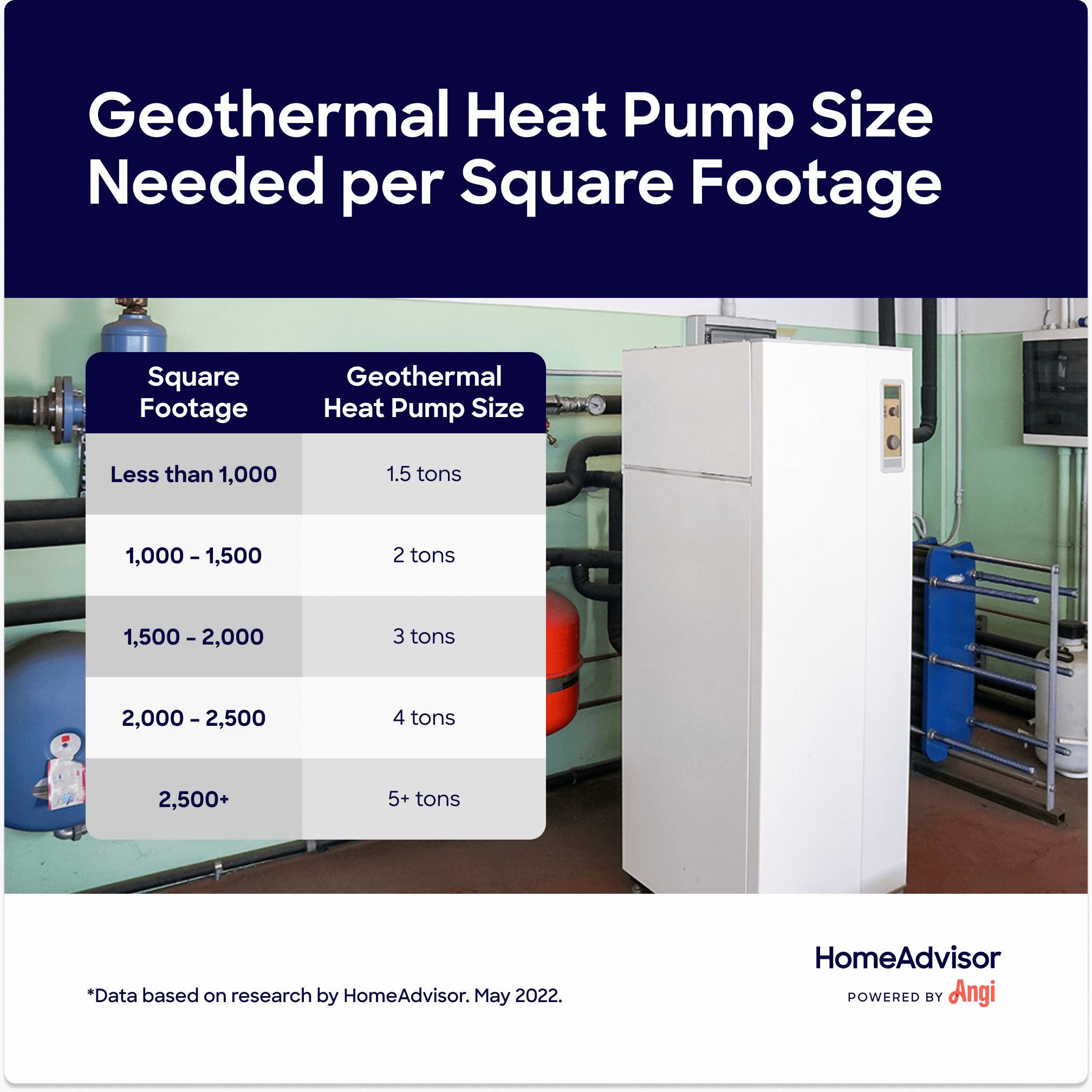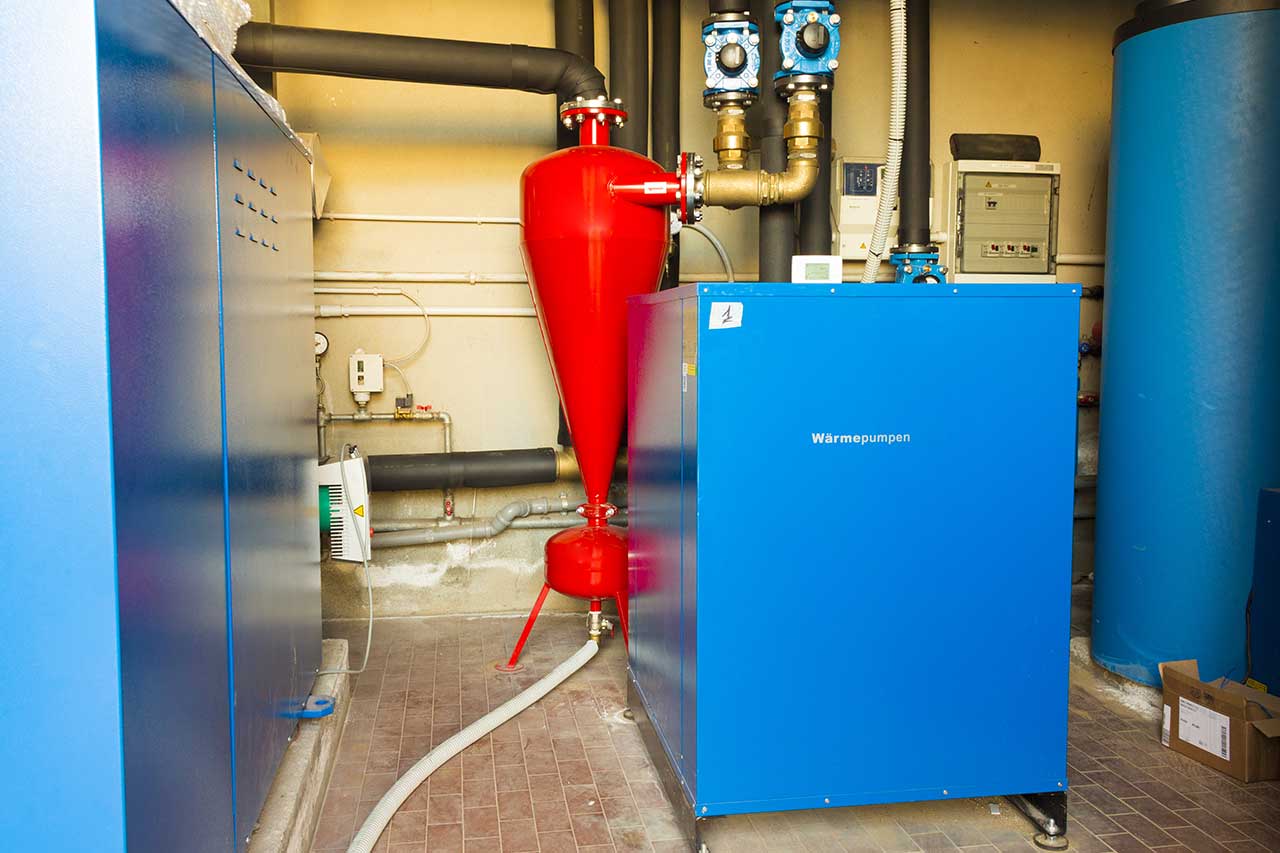How Much Does a Geothermal Heat Pump Cost?
Typical Range:
$2,216 - $4,515
Typical Range:
$2,216 - $4,515
Cost data is based on actual project costs as reported by 62,358 HomeAdvisor members. Embed this data
.
.
.
.
.
.
.
.
.
.
.
.
.
.
.
.
.
.
.
.
.
.
.
.
.
.
.
.
.
.
•
•
•
•
Updated June 22, 2022
Reviewed by Robert Tschudi, Expert Home Building and Remodeling Contributor.The average cost of a geothermal heat pump is between $2,216 and $4,515 based on reports by homeowners, but if you need to install the full system it may cost between $12,000 and $38,000 or an average of $3,200 per ton.
Large units or those that require a full installation with excavation, ground looping, new ductwork, and additional expenses can run as much as $43,000, while smaller projects with access to a water source will generally cost closer to the low end of the price range.
Let's calculate cost data for you. Where are you located?
Where are you located?
| National Average | $3,357 |
| Typical Range | $2,216 - $4,515 |
| Low End - High End | $59 - $50,000 |
Cost data is based on actual project costs as reported by 62,358 HomeAdvisor members.
Geothermal systems come in four varieties or configurations—closed-loop systems, which include horizontal, vertical, and water-source, and an open-loop system—with installations ranging from $2,500 to $5,000 or more per ton. Here is a closer look at the different types of geothermal heat pump systems.
A closed-loop system is a more common option that runs water through a circular loop of piping, typically using an antifreeze liquid solution. Pros can install them in areas with limited water sources, prohibitive environmental regulations, or with pond configurations.
An open-loop system, on the other hand, is a less common option that utilizes ground or well water. They draw clean water in from one intake well and discharge it to a different well or system. They're less expensive to install but require more regular maintenance. A professional can help you determine the best type for your home.
You’ll also want to consult local laws governing open-loop systems, as they have the potential to damage natural water supplies. Your local laws might require you to have a discharge permit or even treat the water before returning it to the ground. All of these factors can increase the cost of your open-loop pump system in the long run.
$15,000–$34,000 (least expensive closed-loop system)
Comes in slinky styles (with overlapping coils) or straight pipes
Slinky options use less land area but need highly conductive soil (the general rule is the deeper, the better)
$20,000–$38,000 (Most expensive, because it involves deep and wide boring)
Runs many feet straight down into the earth
Used when land area is insufficient for a horizontal system
Cost varies depending on pond location
Require a body of water 8 feet deep
More efficient with thermal transfer
$10,000–$28,000
Comes in pipes
Submerged into a body of water
The price of your geothermal installation varies depending on several factors.
Installing a geothermal heat pump in extreme climates will likely cost more than in more temperate climates. For example, putting piping below frost lines requires more material, heavy equipment, and higher labor costs.
Professional soil testing costs run an average of $1,400 and help determine which installation materials will be used. For example, extremely dry soil may need additional irrigation to moisten the soil for better heat transfer.
Check with your local regulatory agency and state environmental and building regulatory agencies to see what regulations are in place.
Open-loop systems draw clean water in from one intake well and discharge it to a different well or system. State water rights and discharge permits will add to the cost of this project. Look into required permits like a National Pollutant Discharge Elimination System Permit to see what’s required. A licensed local HVAC contractor will help with this process.
Your home’s square footage plays the largest role in the price of your geothermal installation. Since prices are based on a ton of capacity, the bigger your home, the bigger the demand for your system, and the bigger the ton of capacity. Here’s a quick overview of the size of geothermal heat pump systems based on square footage.
A moderate-sized home of about 2,400 square feet will need a 4-ton system. On top of that, increased home sizes also mean an increase in the varying sizes of heat exchangers and lengths of looping needed to construct a larger model.
You may need to pay the cost to upgrade your ductwork to accommodate larger systems. Upgrading your ductwork costs from $1,500 to $7,000 for this project.
Geothermal heat pumps qualify for a 26% tax credit through 2022 by ENERGY STAR’s renewable energy tax credit program. This saving goes down to 22% in 2023 and ends at the end of the year. In addition, you can potentially save on geothermal system costs by checking with local rebates.
Retrofitting a geothermal heating and cooling system costs approximately $10 to $20 per linear foot. The average price for retrofitting a whole new duct and ventilation system is $450 to $2,000.
You might get away with simply swapping the two out with a few minor alterations, but if you don’t already have a duct system and are switching from a ductless HVAC system to a geothermal heat pump system, expect to pay closer to the higher range of this price estimate. New constructions are 20% to 40% less than retrofitting your system.
Water-to-air systems are forced air systems that pump hot and cold air throughout your home through ducts. They cost anywhere from $3,500 to $8,000. Water-to-air systems tend to cost less than water-to-water systems because they are less complex to install. Speaking of which, water-to-water systems are designed for radiant floor heaters or baseboard heating systems and cost approximately $4,500 to $9,000.
Geothermal heat pumps both cool and warm your home. A geothermal cooling system uses a heat exchanger and hundreds of feet of piping. In the colder months, the loop’s liquid draws heat from the earth as it circulates. Conversely, it carries heat away from your home in the warmer months, as the ground absorbs the liquid. In virtually all cases, geothermal ACs work better than standard ACs.
Typically, geothermal cooling tends to end up more cost-effective than traditional ACs because of low operational costs and high savings. But geothermal cooling isn’t the only way you can improve your energy efficiency. Improve these additional areas of your home to maximize your geothermal heat pump’s capabilities.
Home insulation costs between $1,400 and $6,300 on average. The better your home's insulation, the less your HVAC system needs to function, further reducing costs and environmental impact.
The cost to install energy-efficient windows is between $300 and $2,000 per window, including the installation. The cost of replacing windows should be a part of your overall home insulation budget. Up to 30% of heat is lost through old windows. Replacing them with low-E coated windows can save up to 15% on your energy bills annually.
Hiring a professional home energy auditor costs between $200 to $700 or $400 on average. An auditor will check your home for leaks and identify opportunities for energy savings.
Cleaning your ductwork costs between $300 to $500 on average. Change the air filter based on the manufacturer's recommendations. Clogged air filters block air circulation, reducing heating or cooling ability and increasing the workload. Additionally, ductwork cleaning costs are well worth it; you should have yours cleaned and inspected at least once a year by a licensed specialist.
There are many benefits to installing a geothermal heating and cooling system, including:
Less energy consumption:25% to 50% less electricity than conventional systems
Lower utility bills: May lower bills by up to 70% in the winter and 50% in the summer
Fewer greenhouse gasses:55% to 60% lower greenhouse gas emissions than air exchange types
Tax incentives: May qualify for 26% tax credit and more depending on location
Short payback period: Pays for itself in just five to 10 years
Low maintenance: Often needs less maintenance work than conventional HVAC systems, potentially saving you $500 per year in heat pump maintenance costs
Long lifespan: Can outlast conventional AC and furnace systems by five to 25+ years
In addition, a professionally installed ground-source heat pump can use three to five times the amount of electricity it uses to heat your home compared to furnaces, which burn as much energy as they generate. This is because ground-source heat pumps use a heat transfer process to exchange heat rather than burn fossil fuels to generate heat. So, while furnaces cost $4,700 on average, which is a lower upfront cost than geothermal heat pumps, they are also less energy efficient.
The cost to install a geothermal heat pump system ranges from $7,000 to $22,000 and is a significant portion—50% to 70%—of the total price of your project. This is not a DIY project. There’s a high level of expertise involved in designing and installing a geothermal system. Professionals will be able to calculate the thermodynamic needs of your home based on the ground, water source, and climate to create a design that’ll meet your needs.
Correctly installed, permanent loops require almost no maintenance or replacement for 50-plus years. Understanding what type you need for your home size, land availability, soil types, and local regulations is best left to a licensed professional.
Geothermal heating is a ground-source heating system that uses the relatively constant temperatures found a few feet under the ground to regulate the temperatures in your home. This type of heat pump system pulls heat into your home from the earth in the winter and moves heat away from your home in the summer.
A geothermal heating and cooling system works using two components: a heat exchanger and several hundred feet of piping. During the winter, the liquid in the loop draws heat from the earth as it circulates. In the summer, the liquid carries the heat away from the home, which the ground then absorbs.
Talk to an HVAC installation pro who can direct you to tax and rebate programs available in your area to help cover the cost of your ground-source heat pump project. Local, state, and federal assistance and rebate programs are often available.
This system uses 25% to 50% less electricity than a conventional HVAC option, according to Energy.gov, and the savings will show up on your utility bill.
Geothermal heating systems can be installed in most climates, regardless of soil type. The main barrier to your ability to install a geothermal heat pump is space. Horizontal loop systems require far more space than vertical loop systems. Similarly, you’ll need space inside the home for the air handler and other parts of the heat pump. For open-loop systems, you’ll need a water supply at least eight feet deep and half an acre wide.

